#jan klata
Text
I guess Klata decided to put a lot of boxes on the stage because "box = case".
i watched 5 minutes of the Jan Klata's production of Przybyszewska's The Danton Case , thanks to @revolutionary-catboy who has uploaded it, and i compared what was said here with the play.
please note that i do not speak Polish and rely on both the subtitles that revolutionary-catboy has kindly provided, and on Bolesław Taborski's English translation of Act 2, Scene 3.
so. i have highlighted some lines that were in the original book, but did not make it into Klata's version.
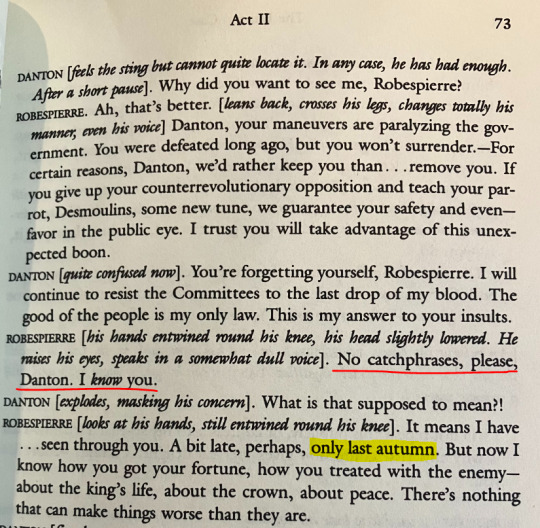
"only last autumn" was Robespierre admitting that it took him roughly half a year to give verbal ultimatum to Danton. It was an incredible sign of humility.
It was one thing for Robespierre to remind Billaud that accusations must be properly sourced, and another thing for Robespierre to go to the person being accused and say that he, Robespierre, already realised that, despite lack of evidence, Danton was not willing to persist in the Jacobinical cause.
And it would be unlikely for Robespierre to come to such a conclusion if the two men had not been close friends, not because friends necessarily align politically, but because only friends could observe any change-of-heart and change-of-mind first-hand.
also, put a pin in the "no catchphrases" line.
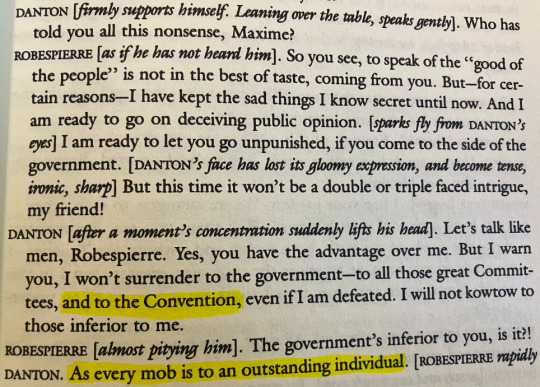
i feel like leaving out Danton's disregard for not just the Committee of Public Safety, but also for the Convention as a "mob", was a critical move on Klata's part.
Robespierre himself was famous for not overriding any decision of the Convention till his very own bitter end, whereas Danton's toxic individualism fully showed in this line.
Klata just made Danton directly say "yes" instead of emphasising himself as "an outstanding individual". In the context of Germinal 1794, this would have been a tactical mistake, since those who thought themselves superior to the government were exactly Provence and Artois; Danton was no royalist, and his basis for despising the Convention was that he, Danton, had personally made contributions towards 10th August 1792; his was a meritocratic viewpoint. Klata flattened this viewpoint and made his Danton even less cautious than in the book.
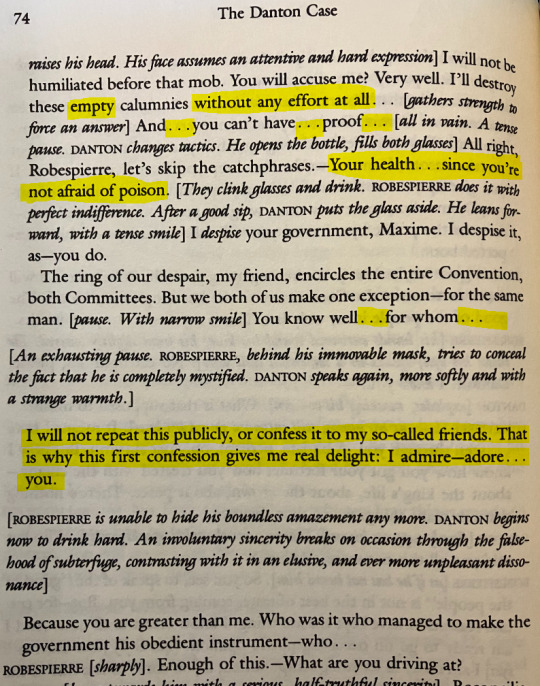
Danton's long tirade, which "mystified" Robespierre, was cut woefully short by Klata.
In the book, Danton was simultaneously boastful and aware of his own failings, using alcohol to confuse his own weakness with that could be brought upon by drunkenness.
This comes down to a confession that, despite Robespierre's competence in, and so-called authority over, the Convention and the Committee, which were mere "mobs" to Danton, Robespierre was the object of Danton's admiration. A real case of the paradox of a larger thing inside a smaller thing.
By deleting ". . ." in Danton's lines, and by not showing the two men drinking or even attempting to pretend to drink together, all of Danton's confusion disappeared in Klata's version. The friendliness, if not friendship, of Robespierre, seemed completely one-sided, and Danton seemed to have made a rational judgement of whether Robespierre was worth any solidarity.
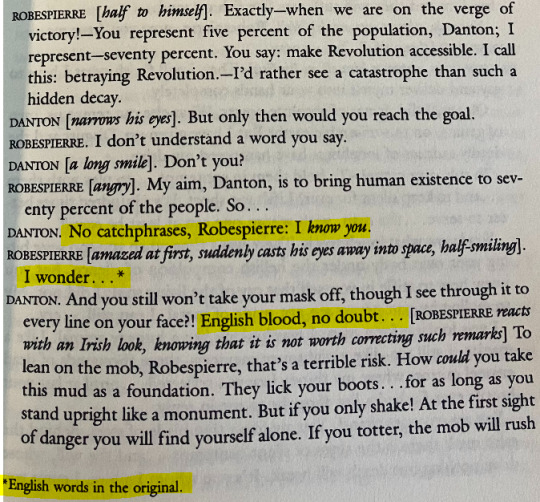
In the book, Danton used Robespierre's line back at Robespierre. Both men were shown to be capable of using catchphrases, and were both urging the other to avoid grand statements and become more sincere, which in political terms was both unknowable and often ineffective. Klata made no use of this symmetry.
Przybyszewska's Robespierre occassionally uttered phrases in English. We must note that, despite the English navy being a major part of the Coalition, the real Robespierre's critiques pointed firmly against Pitt the Younger and his government, and not against the English people. He was well aware of the likes of Joseph Priestley, the Dissenters who supported the Convention in France and who bore the risks for their outspoken anti-monarchy stance.
The infamous London ministry... within, it can hear the cries of the English themselves, ready to call it to account for its crimes ...
(Report on the Political Situation of the Republic, 18th November 1793)
This is contrasted by the enterprising little son of Mars known as Paul Barras, whose anti-English sentiments, though understandable, was xenophobic against an entire people, betrayed the universal spirit of liberty, and therefore unacceptable.
So i see Danton's accusing Robespierre of having "English blood" as a sign of Danton's (unfortunately commonplace) xenophobia. Throughout the revolution, the contrast between claims and actions was a running theme. Recall Abbé Sièyes and his half-measures about what the Third Estate needed. It takes a more realistic character to be dabble at anti-English discourse and also be allegedly involved in the acceptance of English bribes to speak over the committees.
That said, i do like how gentle and reserved Robespierre persisted throughout this scene. it is at least better than the reactionary cliché of the irrational Robespierre and the rational Danton.
I would like to thank @czerwonykasztelanic for bringing this adaptation to my recent attention. he didn't have to read Przybyszewska, really, but he decided to suffer with me anyway; if that was not serious dedication then i do not know what is.
#stanisława przybyszewska#the danton case#sprawa dantona#maximilien robespierre#robespierre#georges danton#danton#frev
19 notes
·
View notes
Text
5.12
Today we compared 3 different versions of Hamlet we learned about: the original, Peter Brook’s and Jan Klata’s. We found many differences between Brook’s and Klata’s interpretations. The latter play was very content specific and a viewer had to have very good knowledge of the 90’s in Poland and of polish symbolism. On the contrary Brook’s play was universal in all of its aspects. Setting, costumes, and props were very universal and impossible to pin point to a certain point in time. The play wanted the viewer to focus on the universal motif rather than trying to prompt its own message.
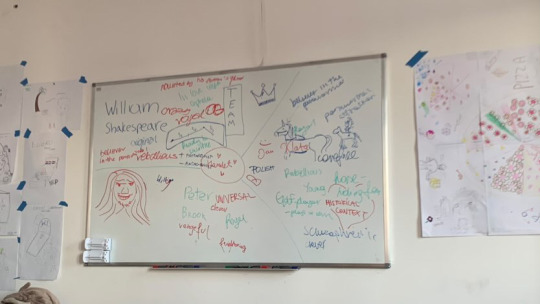
We learned how our summative assessment is going to look like and what TEAM is (Tension Emotion Atmosphere Meaning). It is a method to describe a scene in a play or a movie or really any story. We will have to use this method to present our director’s version of a play during our summative assessment.
0 notes
Text
14th, 21st and 28th of November 2023
These lessons were dedicated to discussing William Shakespeare’s „Hamlet” as well as the most important aspects of the genere (drama).
Summary of the plot:
Hamlet is instructed by his father's ghost to assassinate the new king, who happens to be Hamlet's uncle, to exact revenge for the murder of his father. Hamlet acts to have gone insane, contemplates life and death, and plots his retribution. His uncle likewise makes plans to kill Hamlet due to fear over his own life. The play climaxes in a duel in which Hamlet, his opponent, the King, and the Queen are all murdered.
The book describes Shakespeare’s approach to the story, showing what the author's purpose was in order to create such plot. Understanding a writer's style in literature is a deep investigation that reveals levels of context and significance. These courses go beyond the book and have practical applications in the real world, providing new insights and viewpoints on societal concerns.
On the 14th and 21st of November we've watched two plays which illustrated „Hamlet” by William Shakespeare. On the 28th of November we gathered our knowledge from the previous lessons and we compared the interpretations.
Peter Brook’s „Hamlet”, made in a poor theatre, was a much more universal interpretation. This was achieved by picturing the main character as a man with no certain nationality, but simply a man, Hamlet. Because the play was produced in a subpar theatre, there is a lot of material symbolism (a stick was used as a sword, for instance). Even though we came to the conclusion that both Hamlets were motivated by passion, Brook's was more philosophical.
Second film- an interpretation by Jan Klata, who depicted the protagonist as a Polish man during the 1990’s. after the fall of USSR. The play took place in the Gdansk Shipyard, reminding the viewers of the many protests that took place there which lead to the end of communism in Poland. Hamlet was a Polish male from generation X. Contrary to Peter Brook’s interpretation, to actually understand Klata’s play we had to know background information- the history of Poland. In this interpretation, many methaphorical symbolisms were visible, which alluded to the original plot (example is: Hamlet spilled wine on his mother and uncle, marking them as guilty people)
0 notes
Text
November 30th
On this day we talked about William Shakesperes play called "Hamlet". We started discussing the drama where we mentioned the main characters along with the key points of this tradey. Later on we proceeded to watch an interpretation of it directed by Jan Klata. It took place after the fall of the USSR which is visible as it all takes place in an abandoned shipyard located in Gdansk which brought back the memories of the multiple protests that happened there, which led to the downfall of communism. The props and costumes in it werent very good which highlights how poor poles were during those times.
0 notes
Text
30.11.2023
During today’s lesson we compared Peters Brook “Hamlet” and Jan Klatas “Hamlet”
Next, we discussed the structure of movies and books. We learned that:
The start
Culmination point
Conclusion/Ending
Our homework was to choose an ancient drama that fits the term “TEAM” (Tension, Emotion, Atmosphere, Meaning)
On the picture collection of shapes from chewing gum( the collection is steadily growing every week)
https://ninateka.pl/vod/teatr/h-jan-klata/
https://www.youtube.com/watch?v=84bAaCjSlLA&ab_channel=ShakespeareNetwork
It was a lovely lesson🥰🥰
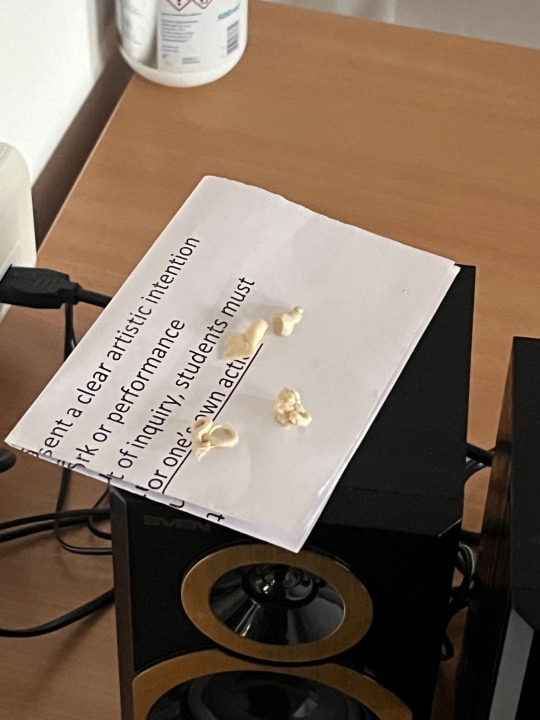
0 notes
Text
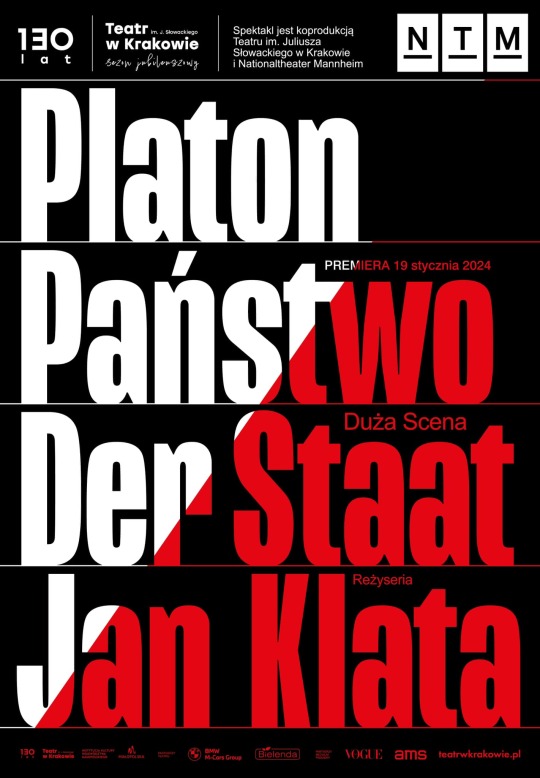
‘Państwo’
Teatr: Teatr w Krakowie - im. Juliusza Słowackiego
Reżyseria: Jan Klata
Drodzy Państwo, mamy to i to chyba aż dwa razy. Po pierwsze: Klata w końcu wraca do Krakowa w wielkim stylu, a po drugie: chyba mam na radarze pierwszego pretendenta do mojej tegorocznej listy najlepszych spektakli 2024 roku. Nie jest to jednak realizacja, która pozwoli nam w łatwy sposób dotrzeć do swojego sedna i zrozumieć wszystko od razu. Bardzo lubię takie spektakle w które trzeba się wgryzać i trawić przez jakiś czas. Taka gimnastyka mózgu pozwala mu chyba nie zaniknąć do końca.
Klata podejmuje się zadania nie tyle karkołomnego, co wręcz absurdalnie trudnego – postanowił wystawić „Państwo” Platona w języku starogreckim uzupełnionym w kilku scenach językiem niemiecki i polskim. Cały przebieg spędzamy ze słuchawką w uchu w której na bieżąco słyszymy tłumaczenie symultaniczne tekstu starogreckiego padającego ze sceny na język polski. Jest to chyba trzeci spektakl w moim życiu, w którym postrzeganie i rozumienie akcji zostaje poszerzone widzowi za pomocą takiego zabiegu jak słuchaweczka do ucha. Spotkałem na mojej drodze teatralnej takie urządzenia jeszcze w „Wieloryb The Globe” w Łaźni Nowej, gdzie pomagały one poczuć, że było się wręcz na wyciągnięcie ręki do całej akcji spektaklu, oraz w „Hańbie” w Teatrze Ludowym (strasznie mi szkoda, że ten spektakl przepadł przez to, że Scena Stolarnia przechodziła remont, bo był to spektakl-petarda). Tam słuchawka w uchu w różnych momentach spektaklu pozwalała usłyszeć rozmowy, myśli bohaterów spektaklu czy kwestie, które nie padały ze sceny, a wręcz chciało się, żeby padły. W „Państwie” natomiast mamy do czynienia z bardzo zgrabnym lektorowaniem, zupełnie jak w filmach w telewizji.
Twórcy odtwarzają „Państwo” Platona w przestrzeni wyjętej poza nawias czasu. Biała półkolista scenografia, służąca jednocześnie jako ekran do projekcji, posiada nawiązania do starożytności, ale są one mocno uszkodzone i – przez swój kolor – prawdziwie laboratoryjne. Nie wiadomo czy jesteśmy teraz czy kiedyś. W określeniu tego nie pomagają mocno futurystyczne kostiumy aktorów. W moim odczuciu taki zabieg wychodzi spektaklowi Klaty na dobre: pozwala dywagować o tym czym jest sprawiedliwość i prawo, a przede wszystkim: wymiar sprawiedliwości, w oderwaniu od obecnych sytuacji w naszym kraju, ale też na świecie. Jednak spokojnie, jeśli ktoś będzie chciał odnieść to, co pada ze sceny, do pewnych obecnie trwających wydarzeń lub takich, które działy się w Polsce przez ostatnie osiem lat, to z pewnością będzie mógł odnaleźć tam nić analogii. Taka właśnie uniwersalność pozwala temu przedstawieniu wybrzmieć nie tylko na naszym narodowym gruncie, ale tez na gruncie Niemieckim (spektakl jest koprodukcją z Nationaltheater Mannheim) i każdym innym, gdzie by się udało tej inscenizacji zawędrować.
Istotną kwestią, która mocno mnie uderzyła w trakcie trwania spektaklu jest skorelowanie wizualizacji Natana Berkowicza (fenomenalne, chyba najlepsze jakie do tej pory wykonał do spektakli Klaty) z tym co się dzieje na scenie. Kiedy Sokrates filozofuje z Trazymachem i Polemarchem na temat tego co jest dobre i co jest sprawiedliwe, scena wręcz mieni się kolorami; pojawiają się fantazyjne wzory i kształty. Przez cały czas gdy jesteśmy w sferze dywagacji, wszystkie twierdzenia Sokratesa mają rację bytu i brzmią słusznie. W momencie jednak, gdy dochodzimy do finału, w którym Sokrates musi wygłosić swoją obronę i cała jego teoria zderza się z realnym światem, wizualizacje przechodzą do kolorów czerni i bieli, by coraz bardziej się rozmywać i finalnie stopić się w szaroburą maź, która potem przejdzie jedynie w ciemność. W moim odczuciu dobitnie to podkreśliło, że idee w zderzeniu z realnym światem i polityką nie są w stanie wyjść obronną ręką i wszystko, co brzmiało tak dobrze w teorii, okazuje się jedynie łatwym do zbycia pyłkiem.
Dodatkowo, w odniesieniu do tego, że spektakl grany jest w 3 językach, czułem, że może być to także próba dialogu z tym, jak prawo jest lub nie jest zrozumiałe. Bez względu na to w jakim języku słuchaliśmy aktorów, całe wykładanie idei było skomplikowane i wymagało od nas ogromnej czujności. Ta myśl uderzyła mnie właściwie w finale, gdy aktorzy zaczynają mówić po polsku, a w tym momencie w słuchawce w uchu zacząłem słyszeć tekst ze sceny tłumaczony na starogrecki.
Bardzo ciekawe jest dla mnie to jak bardzo tak stary tekst nadal wpisuje się we współczesne patrzenie na świat; trochę mnie to zmroziło jak mimo wszystko niewiele posunęliśmy się w rozwoju jako społeczeństwo i jak mocno dalej rozmawiamy o tym samym, ale w coraz mniej sprzyjających warunkach, bo „ci źli” już dawno wyciągnęli lekcje co robić, kiedy my sobie dumamy o tym, co jest finalnie dobre, a co właściwe.
Poza całą warstwą znaczeniową muszę wspomnieć o ruchu scenicznym za który odpowiadał Maciej Prusak. Wyborna robota, dawno nie widziałem tak przemyślanego i ładnie „wychodzonego” spektaklu. A to, jak zaplanowana jest scena mówiąca o jaskini platońskiej, to prawdziwy top of the top. Połączenie choreografii z tekstem, muzyką i wizualizacjami przyprawia wręcz o ciarki.
Jednak finalnie na gromkie oklaski zasługują aktorzy, którzy opanowali tekst i podali go tak, jak gdyby starogrecki był ich językiem ojczystym (chociaż, szczerze mówiąc, mogliby mówić w wymyślonym języku Oompa Loompów i bym pewnie nie zauważył, ale teatr to miejsce gdzie zawiesza się swoją niewiarę i daje się porwać, co też zrobiłem). Dominika Bednarczyk jako Sokrates to klasa sama w sobie, po roli w „Dziadach” myślałem, że nie mogę już od niej oczekiwać więcej, bo każdy jest człowiekiem i ma swoje limity, jednak w „Państwie” dowozi kolejną wywrotkę emocji i tak świdrującego, momentami zagubionego, spanikowanego wzroku, że nie sądziłem,że kiedyś czegoś takiego doświadczę.
Świetna na scenie jest też Karolina Kazoń; długo czekałem, żeby znowu mnie tak zachwyciła jak w „Lalce” w reżyserii Wojtka Klemma, ale hej, stało się. Posągowa rola z potężną dawką energii. Kocham to, co zobaczyłem na scenie i życzę więcej tak dobrych kreacji.
Widać zresztą, że na scenie wszyscy dają z siebie około 250%, bo jest to bardzo wymagający spektakl. Więc raz jeszcze: gratuluję wspaniale wykonanej pracy, oglądać taki zespół to czysta przyjemność, a w tym momencie dla mnie to już chyba obowiązek.
W Teatrze Słowackiego powstał spektakl niezwykle skomplikowany, stymulujący widza i wymagający ciągłej uwagi, ale jednocześnie w jakiś niepokojący, wręcz transowy sposób, przyciągający do siebie oczy. Czy to aktorsko czy znaczeniowo, nie da się od niego uwolnić – ani przez ponad 90 minut kiedy trwa, ani po jego zakończeniu; gdzieś tam w środku w nas pulsuje. I powiem brutalnie – nie obchodzi mnie to, czy inni będą piali z zachwytu czy będą kręcili nosem. Na mnie „Państwo” zrobiło piorunujące wrażenie. I tym bardziej szanuję Klatę z zespołem za to, jakie ryzyko podjęli, bo w takich realizacjach, opartych na takim pomyśle, od spektakularnego sukcesu jest tylko krok od potknięcia się i rozbicia sobie nosa.
1 note
·
View note
Text
2023, szybkie podsumowanie
teatr:
O połowę mniej niż rok temu, ale za to bardzo mocna czołówka. I tak, wciąż - tylko tu jeszcze coś iskrzy.
Art of Living, Kallwat, Stary
Jak nie zabiłem swojego ojca, Pakuła, Łaźnia
Biesy Endemonidos, Wierzchowski, Opole
Ulisses, Kleczewska, Poznań
My way, Krystyna Janda
Melodramat, Anna Smolar, Powszechny
Spartakus. Miłość w czasach zarazy, Skrzywnek, Szczecin
Poza tym, bez kolejności:
Botticelli, Świątek, Słowak;
Świat jest gdzie indziej, M.Czarnik, AST
Opera za trzy grosze, Montag, Stary;
Książę niezłomny, Warsicka, Stary;
Lalka, Klem, Słowak (po raz drugi);
Lazarus, Klata, Capitol Wrocław;
Genialna Przyjaciółka, Marciniak, Stary;
Żywot i śmierć w Sacramento Hersha Libkina, Kielce;
Goście wieczerzy pańskiej, Nowy Teatr, Fryzeł/Bergman;
Balkony. Pieśni miłosne, Lupa, Teatr w Podziemiu Wrocław;
Sen nocy letniej, Klata, Poznań;
Lear, Andrzej Seweryn;
Zmierzch długiego dnia, Perceval, Stary
Empuzjon, Talarczyk, Katowice
a na deser top 5 „o ja pierdolę”
Marzyciele, Teatr Barakhah ("o ja pierdolę" do kwadratu)
Inteligenci, W. Malajkat
Niespodziewany powrót, Karolak & Olbrychski
1984.Ministerstwo miłości, Ludowy
Act of Killing, Klata, Słowak
seriale:
Umiarkowanie, jakby się kończyły. Czyżby został już nam tylko Taylor Sheridan i powtórki z Mad Men?
1. Sukcesja (finał)
2. Tokyo Vice
3. The Last of Us, West Wing (Sorkin!)
4. 1923 (Taylor!), Biały Lotos (s.2), Szpieg wśród przyjaciół
5. The Offer, Emigracja XD, Spy/Master, Uczciwa kobieta
reszta chronologicznie, od końca:
The Crown (s.final), Slow Horses (s.03), 1670, Idol, Warszawianka, Collateral, Trzy dni kondora, Dobre matki, Zakłamane życie dorosłych, Yellowstone (s.05)
filmy:
w tym roku z braku czasu i tytułów wyszło trochę mało, ale genialny Tar nadrabia luki!
Tar
...
W gorsecie
Kos, Filip, Horror Story
Fabelmanowie, Mars Express, Living, Babilon
reszta chronologicznie, od końca: The 50 Year Argument, Na ścieżce wojennej, Czas krwawego księżyca, Goonies, Chleb i sól, Freestyle, Air, Prywatna wojna, Chłopi, 21 Jump Street, Pan Samochodzik, Glass onion, Aftersun, Kosmiczne maszyny, Sharper, Duchy Inisherin, Argentyna 1985, Niebezpieczni Dżentelmeni.
Ale może warto jakoś osobno zaznaczyć te niemoralnie złe produkcje: Różyczka 2 i Lewandowski Nieznany
czytanie:
wydawało się że było tego bardzo mało. a lista całkiem pokaźna. Z regularności to już tylko Dwutygodnik, ale i to po łebkach, i tam nadal wybitne felietony O.Hund(!), czasem jeszcze Bieńczyk w Ksiązkach.
1. Gwiazda piołun - Andrzej Franaszek
2. Ford. Reżyser - Michał Danielewicz
3. Wiersze - Robert Haas,
3. Orwell - Dzienniki z folwarku
4. Schron przeciwczasowy - Gospodinow
4. Wygnaniec. Biografia Baumana - Domosławski
5. Akwarium - o Związku Literatów Polskich - Tomasz Potkaj
Poza tym rozczarowujące umiarkowanie:
Odrzania Rokity, To jest ten wiatr Nowaka, Miłość w czasach zarazy Marqueza, Empuzjon Tokarczuk, Kult Orbitowskiego, (nie)miły facet Glovera, Który tak śpiewa - o ptakach, teksty zebrane pod red. Kornhausera, Lekka przesada Zagajewski, Powszednia historia Sebastian Nowak, Marzenia filmowe Andrzeja Wajdy - Janickiego, Andrzej i Krystyna - późne obowiązki, Odbiorca ubezwłasnowolniony Barańczak, Mieszaniny Jan Błoński, Wypisy z ksiąg użytecznych - Miłosz, Rośliny w wierzeniach i zwyczajach ludowych - Fischer, Przebłyski historii - o Leopoldzie Buczkowskim, Notatnik osobisty - Joseph Conrad, Listy znad jeziora Como - Romano Guardini, Wszystkie drogi prowadzą na Krupniczą, Małe folio - Mrowcewicz, 3-tomowy inwentarz biblioteki Miłosza, komiksy - Wydział 7, SPATIF - Szarłat, Rodzina Monet, Koronkowa robota - Łazarewicz.
Ale - Pan Samochodzik Niemirskiego jest zaskakująco niezły!
granie:
jakoś bez rewelacji i wielkich zachwytów, dlatego w kolejności jakości: Oxenfree 2 - Bryant Cannon, Stray - Blue Twelve, Hogwarts Legacy, Immortality S.Barlow, 12 minutes - Louis Antonio, Florence - Ken Wong. No i wielki powrót czyli remake Tony Hawk Pro Skater 1+2 (!)
outdoor:
za mało wyjść i wystaw, no bo czesiek i wyjazdy! Ale udało się wyrwać parę zachwytów:
Palazzo Barberini w branżowym anturażu, codzienności Joanny Turek (Mocak), Bruno Schulz (Mocak), wrocławskie murale na Roosvelta, ogród Bellingham, dom napoleona na Elbie, muzeum i studio Paramount, themepark Universala
jedzenie:
bardzo, bardzo dużo dobroci i przyjemności. Filthy Fried Food wielokrotnie, podobnie jak Diavola w Nolio, a poza tym świętomarciński obiad (gęsie serca w żurku), pizza z kwadratowego psa, gdyńskie chapki, czyżby najlepsza pizza ever w Quarterspace w LA, tamże dajner Burger'n'Pie, in-&-out, butterbeer w Harry Potter World, dużo dobrego we Włoszech (Elba i rzymskie smaki od Rachel Roddy), śniadania i kolacje w Cannes, wspaniały winebar w Nicei i przepyszne bistro pożegnalne w tejże, wybitna uczta w bistro w Annecy, roztoczańskie łupcie z kaszą gryczaną, kaszubskie ryby, poznańscy winnowiercy, wrocławski kotlet w Młodej Polsce, uczty w Bibendzie, smaczności w kropce, samotne Lupo, wspólna Madonna i Allora.
Do tego dużo dobrego na tarasie, fenelowa majówka u kasi, ostatki balkonowe na Sarego, pijane Confetti Fest, gulasz u Andertów, cykl styp i pogrzebin w Żonglerce, pizza u Konrada, wigilia Pigeon, Ekipy i Wieliczka
1 note
·
View note
Text
30/11/2023 Class
Today’s class we have started by talking about the „H.” - Jan Klata’s interpretation of the William Shakespeare’s Hamlet (Filmed in 2002). Actually, it was a discussion between me and the teacher only, because I was the only person in my group, who has watched the movie. We have come to a conclusion, that „H.” is actually a movie about the Polish people after the first free elections in 1989. It shows the anger of those who didn’t use the occasion of the new system to get rich. The main character, Hamlet, symbolises the people who didn’t upgrade their level of life after 1989 or even lost something in the capitalist economical system.
After that, we compared three „Hamlets”: the original written by William Shakespeare, the Peter Brooks minimalist interpretation and Jan Klata’s movie.
At the end of the lesson, the teacher explained what our summative will be about
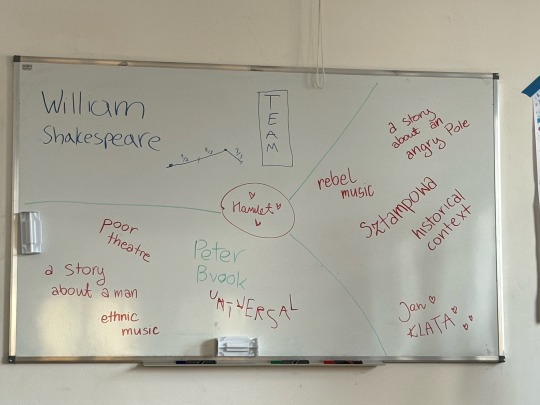
0 notes
Text
30.11.23
Today we compared two versions of the hamlet movies we watched on previous lessons. Peter Brook vs Jan klata. During the comparison we have discussed hamlet on a deeper level analyzing many scenes and motifs. We also had a quick introduction to the summative project.
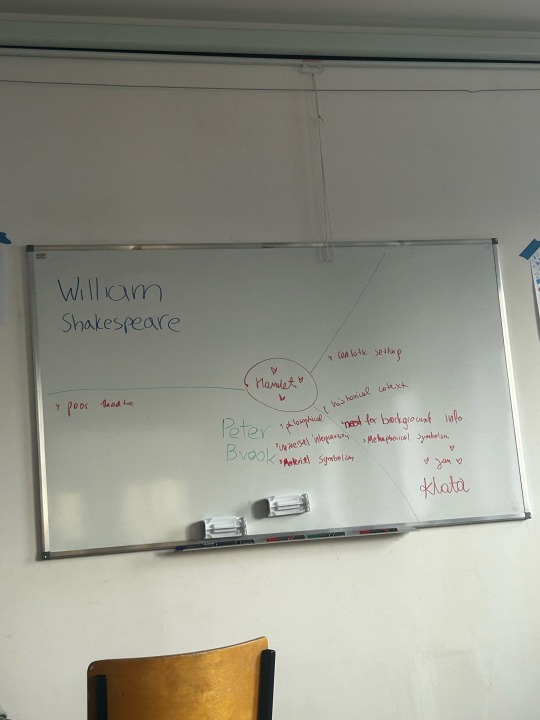
0 notes
Text
Comparison of Peter Brook's and Jan Klata's "Hamlet"
While adaptations of the classic, which Shakespeare's "Hamlet" undoubtedly is, by Peter Brook and Jan Klata, seem to have many things in common, they differ much when it comes to a more detailed analysis of plays. Peter Brook's version removes political aspects and rearranges the text to focus on Hamlet's philosophical questions, presenting a distilled and enigmatic exploration of existence with clear simplicity. Adrian Lester emphasizes Hamlet's questioning, making the play an inquiry about his identity and the surrounding universe.
On the other hand, Jan Klata's adaptation takes a more contemporary and provocative approach. Set in a Gdańsk shipyard, it comments on post-Solidarity Poland, incorporating modern elements like techno music and celebrity culture. Klata uses symbolic elements like books and dance, and the Mousetrap scene becomes a commentary on modern theatre. Dmitrij Schaad's Hamlet is a modern celebrity with a rebellious edge, and the final scenes introduce Fortinbras as a pragmatic politician. Klata's play explores memory and forgetfulness, using a mix of Polish and English to convey a message of "Performance Rules."
In essence, while Brook's production delves into the metaphysical drama of Hamlet, Klata's version is a contemporary, visually dynamic commentary on both the play and modern society.
0 notes
Text
Comparison of the Three Versions of Hamlet.
I had the opportunity to explore three versions of Hamilton: the original one written by Shakespeare, a movie adaptation created by Brooke, and a different, polish movie adaptation by Klata. All three versions depict the life and struggle of Hamlet, yet each version is significantly different from the other. The original Hamlet followed the story of Hamlet and since it was a book version, the readers could only rely on the text and perhaps their imagination. That may be the reason why I found this version the least exciting and entertaining out of the three. Of course, if it were not for Shakespeare's version, Hamlet would not exist, and the iconic monologue "To be or not to be" wouldn't exist either. Overall, the original focuses more on the story rather than focusing on anything else. Jan Klata's adaptation "H." is completely different from the original, it heavily focuses on symbolism and metaphors while also disapproving modern-day approach to acting. "H." is a movie which means it has more space to reach the audience and it used that area very well. The golfing outfits, the Hussar King Hamlet, the new King, and Hamlet's uncle focus more on wine than the country's wellbeing. All the metaphors and symbols build a very strong meaning behind the movie. The last version, Brook's adaptation is also very interesting. His main focus is of course the acting. You can tell that the actors put much effort into the play with extremely long verses that they manage to say in one breath. Thanks to the acting, the adaptation is mesmerizing and overall incredible.
All three versions deserve all the attention they get and depict the very different meanings and aspects of "Hamlet".
0 notes
Text
5.12
Today’s class started with a comparison of 2 versions of Hamlet spectacle - one directed by Peter Brook, and the other by Jan Klata. We have written out all of the differences that we noticed on the board and had a discussion. Then, we talked about how theatre looks on standard and high level in DP. Thirdly, we were assigned a summative and the teacher presented us all of the criterion’s for it. Finally, we have talked about the concept of Teatr ubogi.
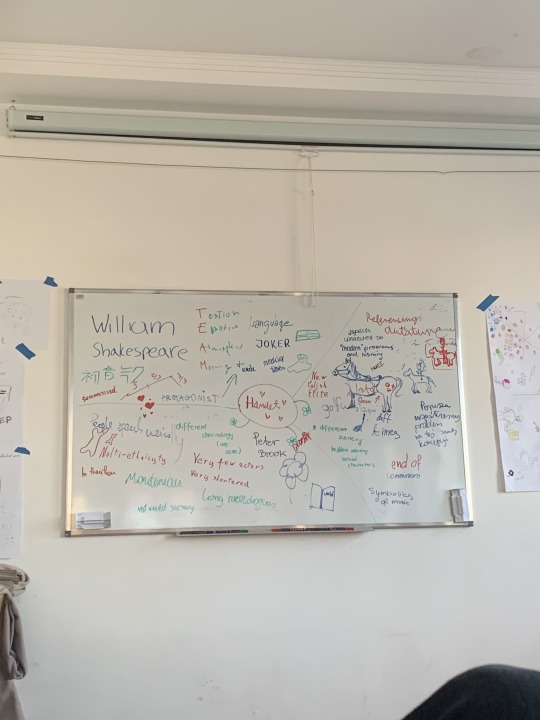
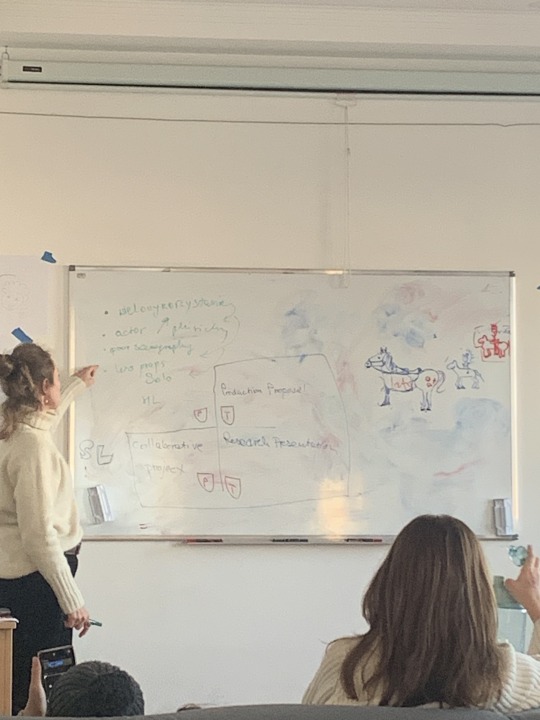
0 notes
Text
21.11
Today we watched Hamlet interpretation by Jan Klata. He set the stage in the 90’s in Poland. The hamlet he created was a metaphor of a victim of rapid privatisation of Poland in that time.
0 notes
Text
On todays lesson we talked about three „different” hamlets: the original one by William Shakespeare, the interpretation by Jan Klata, and the interpretation by Peter Brook. Than we discussed about TEAM - Tension, Emotion, Atmosphere, Meaning. Than we talked about out next summative assessment and how theater looks in dp on higher level.
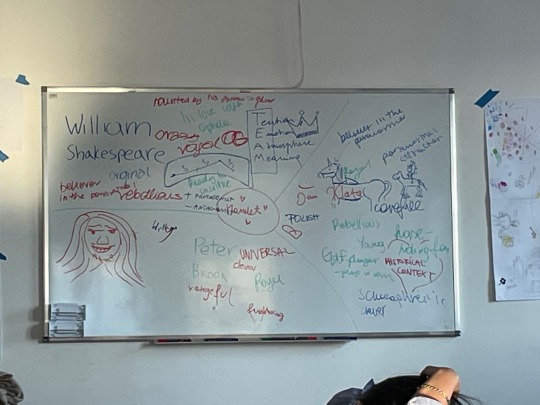
0 notes
Text
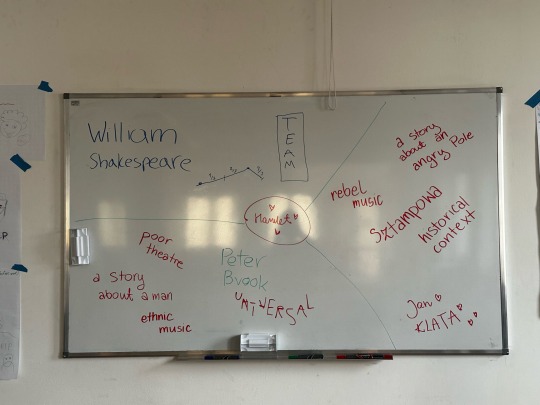
During today (30.11.2023) lessowe discussed different interpretations of Hamlet. First we discussed the original version written by William Shakespeare. His Hamlet was a dreamer, ambitious, a man of honor, emotional, follows his emotions, injured and embittered.
Jan Klata’s and Peter Brook’s character is the same, however the setting and characteristics of the movie are different.
Jan Klata’s movie has rebel music, is a story about a angry pole, has historical content.
Peter brook’s movie, on the other hand, has ethnic music, is a story about a man, and is universal.
1 note
·
View note
Text
30.12.2023 Lesson
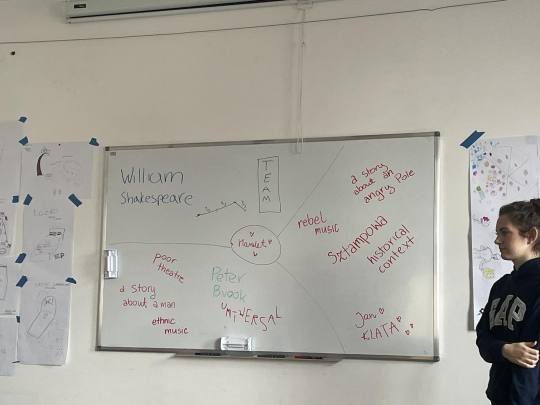
In today's lesson, we focused mainly on talking about Shakespeare and his work. Then we compared Peter's brook " Hamlet" and Jan's Klata "Hamlet ." We concluded that Jan's Klata:
It has a story about an angry pole
It is cliched
It has a historical context
It has rebel music
While Peter's Brook:
It is a story about a simple man
It is universal
It has a poor theatre
It has ethnic music
Finally, we discussed the structure of movies and books. It divides into the start (1/3), then the continuation (2/3), and after the culmination point, the ending (1/3).
Our homework is to choose an ancient drama, which we also talked about. It should fit the term " Team," which stands for Tension, Emotion, Atmosphere, and Meaning.
0 notes